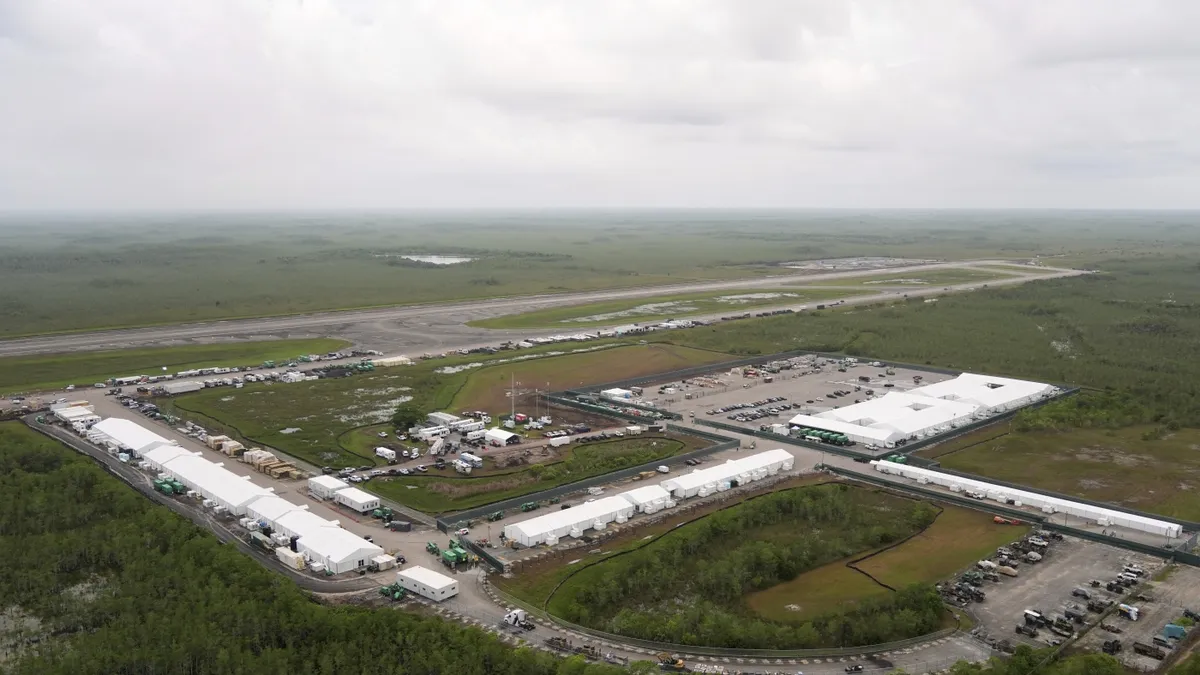
MIAMI — A recent lawsuit initiated by environmental organizations and the Miccosukee tribe has raised significant concerns regarding the construction and operations of an immigration detention center in the sensitive ecosystem of the Florida Everglades. The legal proceedings concluded on Wednesday, yet numerous critical questions remain unanswered. A pivotal inquiry posed by U.S. District Judge Kathleen Williams during the four-day hearing was, "Who's running the show?" regarding the facility colloquially referred to as the "Alligator Alcatraz."
During the hearings, attorneys representing the two environmental groups brought attention to comments made by officials from the Trump administration, which indicated that the facility is an Immigration and Customs Enforcement (ICE) center. However, Florida's legal representatives argued that it operates as a state detention center under ICE's authority, yet they were unable to clarify who is actually overseeing operations at the site. This ambiguity raises crucial questions about governance and accountability, particularly as immigration detentions and operations continue while the legal battle unfolds.
The environmental organizations, namely Friends of the Everglades and the Center for Biological Diversity, alongside the Miccosukee tribe, contend that the expedited construction of the detention facility, which occurred without public input or a comprehensive environmental impact assessment, contravenes federal law. They are urging the court to halt operations at the facility. Central to their argument is the National Environmental Policy Act (NEPA), which mandates federal agencies to evaluate alternatives, involve the public, and assess environmental impacts before advancing any project.
Lawyers representing the state of Florida and the Trump administration asserted in court that federal laws do not apply to the facility since it was constructed and is operated by the state. Justice Department attorney Adam Gustafson emphasized that this case fundamentally revolves around control, suggesting that the federal government lacks authority over the activities at the location. Paul Schweip, an attorney for Friends of the Everglades, challenged this position, arguing that the detention center's primary function—immigration detention—falls under federal jurisdiction.
The detention center, designed to accommodate up to 5,000 immigration detainees, is situated at a seldom-used airfield within the Big Cypress National Preserve. During the hearing, environmental groups presented evidence highlighting the detrimental effects that increased activity and population density at the site are having on protected species and local water quality. Wildlife ecologist Randy Kautz, instrumental in developing Florida's Panther Recovery Plan, testified that the facility's bright lights and heightened human activity could displace Florida panthers from approximately 2,000 acres of their habitat. This is particularly alarming given that only an estimated 120 to 230 endangered panthers remain in the state.
Wetlands ecologist Christopher McVoy, who contributed to the Everglades restoration plan, expressed serious concerns regarding 20 acres of new asphalt paving at the site and its potential repercussions on the fragile ecosystem's water quality. McVoy noted that the Everglades ecosystem typically has low levels of nitrates and phosphates—nutrients that can lead to excessive plant growth. He warned that runoff containing these nutrients and other pollutants could severely impact native vegetation and surrounding wetlands.
Members of the Miccosukee tribe also provided testimony regarding the adverse effects of increased activity at the detention center on nearby tribal communities. Several tribal villages are located just a few miles from the facility, and witnesses reported that runoff from the site often flows south toward these villages, potentially carrying contaminants harmful to both the environment and human health. Furthermore, they raised alarms about the facility's bright lights affecting the endangered bonneted bat, further underscoring the environmental stakes involved in this case.
In light of these concerns, the environmental groups and the Miccosukee tribe are requesting Judge Williams to issue a preliminary injunction. This injunction would mandate the state and federal governments to remove lighting, fencing, and waste from the site, restore access for Miccosukee tribe members, and cease operations within 14 days. The outcome of this lawsuit could have significant implications for both the detainment of immigrants and the preservation of the delicate Everglades ecosystem.